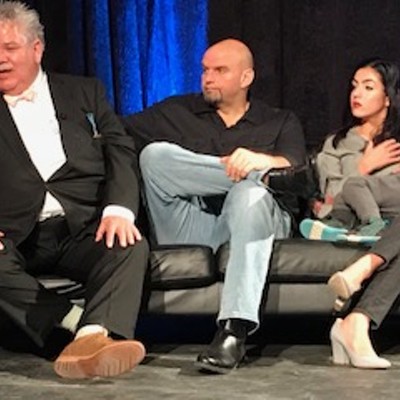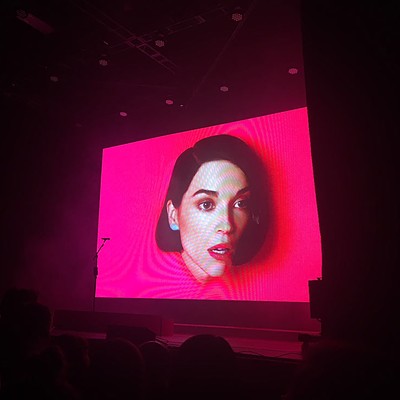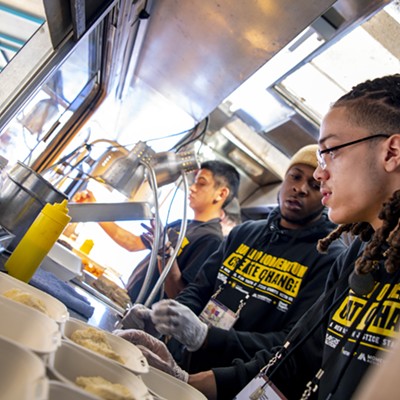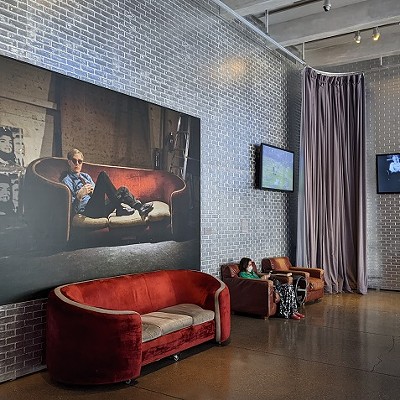Wednesday, January 10, 2018
Pittsburgh's Racial Justice Town Hall facilitates intimate discussions between local leaders and constituents
Talking about racism isn't new. Actual actions resulting from talks are less common. But for 20 years, the annual Summit Against Racism has worked to bring together Pittsburgh residents and those in power to develop solutions to the racial injustices still very much present in our society.
Last evening, organizers behind the annual event brought together elected officials, leaders and representatives to not only speak directly to constituents, but to listen to the experiences of those facing everyday racism. The town hall acted as a preview of the 20th Summit Against Racism scheduled for Jan. 20 at the Pittsburgh Theological Seminary.
Designed to provide an intimate experience, the Racial Justice Town Hall fostered candid dialogues between Pittsburghers from across the city and local leaders. The event lasted for nearly three hours Tuesday night at the Union Project in Highland Park.
“We shouldn’t wait on policy to make change in the community,” said Valerie Allman, a volunteer moderator at the town hall. “We’re addressing racism by focusing on the conversation.”
Before dispersing into smaller groups, representatives were asked what they have done as leaders to address racism throughout their careers. Each divulged their experiences, observations and thoughts on solutions to fight racism.
Valerie McDonald-Roberts, the city’s chief urban affairs officer, spoke of her experiences in the ‘80s when she ran for a seat on the Pittsburgh Public School Board. That run was spurred by an instance when her daughter failed a quiz due to a biased question.
“‘The baby has blank cheeks?’... the right choice was pink,” McDonald-Roberts said. “If you find a question like that in a first grade curriculum, where else would you find instances that there is bias and racism [in the school]?”
State Rep. Ed Gainey expressed that, as schools place higher emphasis on learning European history, students fail to learn about immigrants, people of color and “black assets” who have shaped American history.
Nineteen-year-old Jamar Davis, who was representing Marita Garrett, mayor of Wilkinsburg, shared his experiences as a young person in Pittsburgh.
“Being this young I haven’t really lived through the struggle,” Davis said. He explained that most of the racism he sees occurs on social media. But he added that he’s always looking for opportunities, like attending the town hall, to create more exposure on how to combat racism.
After the panel discussion, the crowd of approximately 200 was broken up into groups of 10 for smaller discussions on race. Organized in three 15-minute rounds, leaders moved from table to table to speak with participants about the current political sphere, how to cope with traumatic situations and how to build inclusive communities and inspire change.
Some residents said community members are scared to be vulnerable with elected officials. They said talking about racism and how to combat it is not a new topic, but that communities become discouraged when talks of affordable housing fall through and livable wages aren’t an option to everybody.
The night ended with chants and promises to continue this dialogue, not only in preparation for the Summit later this month, but to inspire change.
Last evening, organizers behind the annual event brought together elected officials, leaders and representatives to not only speak directly to constituents, but to listen to the experiences of those facing everyday racism. The town hall acted as a preview of the 20th Summit Against Racism scheduled for Jan. 20 at the Pittsburgh Theological Seminary.
Designed to provide an intimate experience, the Racial Justice Town Hall fostered candid dialogues between Pittsburghers from across the city and local leaders. The event lasted for nearly three hours Tuesday night at the Union Project in Highland Park.
“We shouldn’t wait on policy to make change in the community,” said Valerie Allman, a volunteer moderator at the town hall. “We’re addressing racism by focusing on the conversation.”
Before dispersing into smaller groups, representatives were asked what they have done as leaders to address racism throughout their careers. Each divulged their experiences, observations and thoughts on solutions to fight racism.
Valerie McDonald-Roberts, the city’s chief urban affairs officer, spoke of her experiences in the ‘80s when she ran for a seat on the Pittsburgh Public School Board. That run was spurred by an instance when her daughter failed a quiz due to a biased question.
“‘The baby has blank cheeks?’... the right choice was pink,” McDonald-Roberts said. “If you find a question like that in a first grade curriculum, where else would you find instances that there is bias and racism [in the school]?”
State Rep. Ed Gainey expressed that, as schools place higher emphasis on learning European history, students fail to learn about immigrants, people of color and “black assets” who have shaped American history.
Nineteen-year-old Jamar Davis, who was representing Marita Garrett, mayor of Wilkinsburg, shared his experiences as a young person in Pittsburgh.
“Being this young I haven’t really lived through the struggle,” Davis said. He explained that most of the racism he sees occurs on social media. But he added that he’s always looking for opportunities, like attending the town hall, to create more exposure on how to combat racism.
After the panel discussion, the crowd of approximately 200 was broken up into groups of 10 for smaller discussions on race. Organized in three 15-minute rounds, leaders moved from table to table to speak with participants about the current political sphere, how to cope with traumatic situations and how to build inclusive communities and inspire change.
Some residents said community members are scared to be vulnerable with elected officials. They said talking about racism and how to combat it is not a new topic, but that communities become discouraged when talks of affordable housing fall through and livable wages aren’t an option to everybody.
The night ended with chants and promises to continue this dialogue, not only in preparation for the Summit later this month, but to inspire change.
Tags: Summit Against Racism , Union Project , Marita Garrett , Valerie McDonald-Roberts , Jamar Davis , Ed Gainey , Image
















